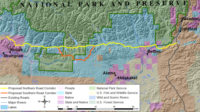The Biden administration has dealt what some in industry and state government view as a double blow to resource development in Alaska. In one move announced earlier this month, the U.S. Interior Dept. said it denied permission for a $600-million project to build a 211-mile private mining access road that would have cut through the Gates of the Arctic National Park and Preserve. In the other, the agency announced stronger environmental protections for 13 million acres of oil-rich federal land in the National Petroleum Reserve-Alaska.
“Today’s historic actions to protect lands and waters in the western Arctic will ensure continued subsistence use by Alaska Native communities while conserving these special places for future generations,” John Podesta, senior climate policy advisor to President Joe Biden, said in an April 19 news release.
The department’s choice of the “No Action” alternative for the Ambler Road project followed a two-year supplementary environmental review by its Bureau of Land Management to address deficiencies related to subsistence impacts.
The remote gravel road would have run between the James W. Dalton Highway and the Ambler Mineral Belt, where an estimated $7.5-billion copper deposit is buried under ecologically sensitive land. The proposed road, not designed or open for public access, would be used by industrial traffic to support mine operations throughout the Ambler Mining District.
The mining company decried the decision saying the proposed plan included rigorous mitigation measures to protect natural resources, wildlife, and subsistence lifestyles.
"It is clear that the Ambler Access Project can be constructed safely and with minimal environmental disturbance," said Kaleb Froehlich, Managing Director of Ambler Metals in a statement. “We remain committed to this important project and will continue to push forward using all possible avenues.”
The additional review found the Ambler Road would require more than 3,000 stream crossings, could impact at-risk wildlife populations and could have irreparable impacts on permafrost, making it unlikely the road could be reclaimed.
Alaska's U.S. Sen. Lisa Murkowski (R) and other senior state leaders decried the move, saying it would hamstring efforts for responsible resource development in the state.
“The Biden administration may be focused on short-term political gains, but at the expense of Alaska’s long-term future, limiting jobs for Alaskans, revenues for our state, and the future energy and mineral security of our nation,” she said in a statement.
The US Army Corps of Engineers and Bureau of Land Management approved the road plan in 2020 and officials agreed to issue a 50-year right-of-way for the Alaska Industrial Development and Export Authority, the state public corporation working to develop the project.
But in response to a legal challenge from environmental advocates and Alaska Native groups, the administration suspended construction plans in 2022 pending the added environmental review. The “No Action” move ensures the authority will not receive a right-of-way.
The project “would significantly and irrevocably impact resources, including those supporting important subsistence uses, in ways that cannot be adequately mitigated, Interior said.

Map courtesy National Parks Service
Maximized Protections
In the case of the National Petroleum Reserve-Alaska, the government finalized a rule to maximize protections for public land stretching from the Brooks Range to the Arctic Roast, much of which is occupied by tribal nations who rely on it for subsistence—harvesting caribou, shorebirds and waterbirds and many other fish and wildlife species.
First proposed in 2023, the rule encompasses roughly 23 million acres of public land managed by the Bueeau of Land Management. The final rule, among other things, limits future oil and gas leasing and industrial development in parts of the reserve that are prized for their wildlife, including grizzly and polar bears, caribou and hundreds of thousands of migratory birds.
Brian Ridley, chief of the Tanana Chiefs Conference, called the Ambler Road project rejection “a monumental step forward in the fight for Indigenous rights and environmental justice.” But all three members of Alaska’s congressional delegation denounced Interior’s actions.
“Closing off NPR-A is a huge step back for Alaska, failing to strike a balance between the need for gap oil and natural gas and legitimate environmental concerns, and steamrolling the voices of many Alaska Natives in the decision-making process,” said Rep. Mary Sattler Peltola (D-Alaska).
The moves came 13 months after President Biden approved the $8-billion Willow oil drilling project on federal land several hundred miles north of the proposed Ambler Road. Work on the project began last year after the U.S. Court of Appeals in San Francisco denied an injunction sought by project opponents as part of their ongoing lawsuit to halt development.




Post a comment to this article
Report Abusive Comment